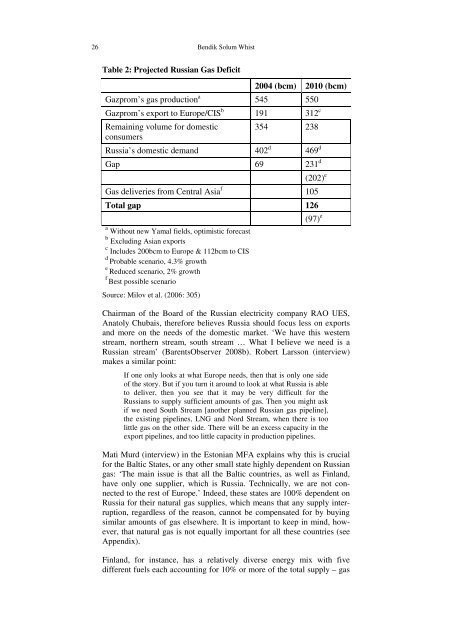Nord Stream: Not Just a Pipeline
Nord Stream: Not Just a Pipeline
Nord Stream: Not Just a Pipeline
Create successful ePaper yourself
Turn your PDF publications into a flip-book with our unique Google optimized e-Paper software.
26 Bendik Solum Whist<br />
Table 2: Projected Russian Gas Deficit<br />
2004 (bcm) 2010 (bcm)<br />
Gazprom’s gas production a 545 550<br />
Gazprom’s export to Europe/CIS b 191 312 c<br />
Remaining volume for domestic<br />
consumers<br />
354 238<br />
Russia’s domestic demand 402 d 469 d<br />
Gap 69 231 d<br />
(202) e<br />
Gas deliveries from Central Asia f 105<br />
Total gap 126<br />
a<br />
Without new Yamal fields, optimistic forecast<br />
b<br />
Excluding Asian exports<br />
c<br />
Includes 200bcm to Europe & 112bcm to CIS<br />
d Probable scenario, 4.3% growth<br />
e Reduced scenario, 2% growth<br />
f Best possible scenario<br />
Source: Milov et al. (2006: 305)<br />
(97) e<br />
Chairman of the Board of the Russian electricity company RAO UES,<br />
Anatoly Chubais, therefore believes Russia should focus less on exports<br />
and more on the needs of the domestic market. ‘We have this western<br />
stream, northern stream, south stream … What I believe we need is a<br />
Russian stream’ (BarentsObserver 2008b). Robert Larsson (interview)<br />
makes a similar point:<br />
If one only looks at what Europe needs, then that is only one side<br />
of the story. But if you turn it around to look at what Russia is able<br />
to deliver, then you see that it may be very difficult for the<br />
Russians to supply sufficient amounts of gas. Then you might ask<br />
if we need South <strong>Stream</strong> [another planned Russian gas pipeline],<br />
the existing pipelines, LNG and <strong>Nord</strong> <strong>Stream</strong>, when there is too<br />
little gas on the other side. There will be an excess capacity in the<br />
export pipelines, and too little capacity in production pipelines.<br />
Mati Murd (interview) in the Estonian MFA explains why this is crucial<br />
for the Baltic States, or any other small state highly dependent on Russian<br />
gas: ‘The main issue is that all the Baltic countries, as well as Finland,<br />
have only one supplier, which is Russia. Technically, we are not connected<br />
to the rest of Europe.’ Indeed, these states are 100% dependent on<br />
Russia for their natural gas supplies, which means that any supply interruption,<br />
regardless of the reason, cannot be compensated for by buying<br />
similar amounts of gas elsewhere. It is important to keep in mind, however,<br />
that natural gas is not equally important for all these countries (see<br />
Appendix).<br />
Finland, for instance, has a relatively diverse energy mix with five<br />
different fuels each accounting for 10% or more of the total supply – gas













